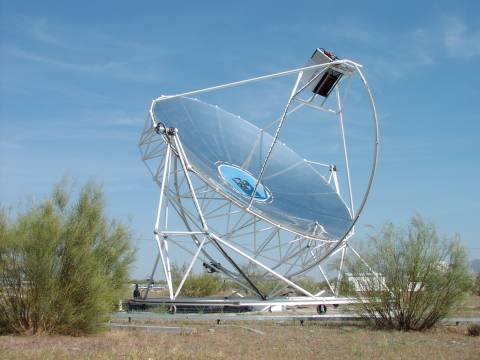Over on wastewatts someone was suggesting building solar collectors for the likelihood of future energy shortages. Besides the fact that he was suggesting using old 7' satellite dishes (which wouldn't work mechanically), I had to point out the biggest problem: converting the heat generated during the day into something useful.
Sure, the sun puts out a tremendous amount of energy: a kilowatt per square meter (about a square yard). But don't expect to plug your computer into that, you've got to convert it, and today's prospects aren't very good. Solar cells are typically in the single digits for efficiency, and running a turbine with steam or something else is a huge, complicated (and dangerous) mess. Solar Stirling engines are pretty cool, but stirling engines end up with efficiency issues just trying to move heat from one place to another. (There's something like four heat exchangers in a typical stirling engine, but despite the complexity, people keep trying to build them anyways.)




Even plants don't do that well. Your standard corn crop converts about 1-2% of the sun to sugars and oils, while sugar cane beats everything else while still only converting 8% of the light absorbed to chemical energy (mostly sugar).
There's also the problem that the sun is only out during the day, and in the winter time when you might be able to use the heat directly, the sun isn't out very much. So what starts out sounding great: 5 hours * 4 square meters * 1kWh/m = 20 kWh, ends up being butchered down to something much less impressive.
This led me to an aha realization: "Most people don't understand that changing energy from one form to another involves losing some of that energy in the process."
"Making" hydrogen from water using electricity, is not the great idea people think it is. Electric heat is about the worst way to warm yourself when you start including the losses that went into generating the power. Combine efficiency issues with a lack of understanding about thermodynamics and conservation of energy, and you get people designing yet another perpetual motion machine, vortex generator, or some other free energy machine in their backyard.
Based on my informal study of the field (this wasn't my major in college), here's my rule of thumb for conversion efficiencies (thermal to electrical to mechanical to potential to chemical to whatever):
Category 1: Low (5-10%)
Do it yourself (homebrew/tinkering) and products where efficiency isn't important. The electric light bulb? about 5%. The motor in your desk fan? Maybe around 10%. The little wall wart down-converting line power to 6V for your cordless phone? As low as 0% (These things waste power even when the device that uses them is off. Electric company surveys usually identify 5-10% of household power is wasted by these things.)
Category 2: Medium (35-60%)
Machines industry creates when profits are on the line. Large trucks these days probably get 35-40% of the energy in the gas translated into mechanical acceleration. Of course you throw it all away when you step on the brake. Modern power generation ranges from 40-55% depending on whether there is a second stage steam turbine using reclaimed heat. Cell phones do pretty well in extending talk time by using power smartly.
Category 3: High (85-98%)
This is the domain of R&D and exotic technologies. Magnetically suspended high vacuum flywheels (energy storage), custom wound pancake motors with rare earth magnets, rocket motors, fuel cells, etc. Lots of exciting things there, but not within reach of consumer. At least, not for the next 10-20 years.
Obviously there are a few exceptions, but in general its a far better idea to avoid any and all conversions when possible. Two conversions (home brew) leaves you with less than a quarter of a percent of what you put in, and three conversions leaves you with 0.01% (or 8kW in for every 1W out).
So when someone talks about taking an old windmill used for pumping water about a hundred years ago, and using it pressurize air, which will then spin a generator on demand ... I'd shake my head and not loan them any tools or parts which I wanted back.


And don't even ask them about maintenance efforts and costs on that contraption.
A lot of people are predicting the end of cheap energy. Some see chaos resulting, but others see us tightening our belts and using technology to help us do more with less. I hope the later are correct. Understanding conversion efficiencies, and avoiding them where possible would be a start.
[links]
Why Study Photosynthesis, Arizona State University, 1996.

